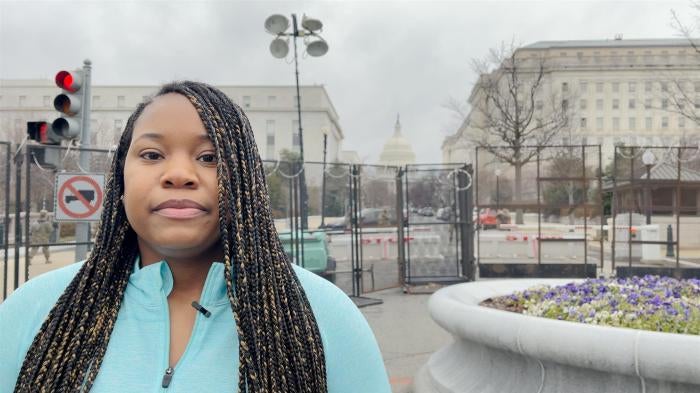Dreisen Heath Testifies Before US Congress in Support of Bill H.R. 40
Read a text description of this video
#ReparationsNow
Washington, D.C.
Dreisen Heath, US Program, Human Rights Watch
From a very early age, my parents talked about Tulsa.
That was my birthplace.
Being connected to a place like that always haunted my adolescence because I’m hearing stories about hundreds of people being massacred and an entire town destroyed.
Dreisen Heath, US Program, Human Rights Watch
They somehow rebuilt it and then it was destroyed again. And to have that cycle of destruction, it’s the story of being Black in America.
As a child, to say “Well, what really am I capable of?”
Will it be taken away from me because of systems of oppression and white supremacist violence?
It’s a kind of fear but also just sadness and so much appreciation for the generations of Black folk who just powered through.
Feb. 16, 2021
Washington, D.C.
Dreisen Heath, US Program, Human Rights Watch
In one day, I’ll be testifying before US Congress on the bill H.R.40, the Commission to Study and Develop Reparation Proposals for African-Americans Act.
Originally, I was scheduled to be inside the Capitol but because of Covid-19 and also the recent January 6 attack, the hearing is all virtual but that doesn’t take away from the significance of this hearing and we’re ready to move forward.
H.R. 40, named after the broken promise of “40 acres and a mule” to enslaved people after the emancipation, was first proposed in 1989 by Representative John Conyers.
Dreisen Heath, US Program, Human Rights Watch
There’s a lot of pressure to be a Black woman in this space, to be a younger person in this space, pushing the boundaries.
So, even the writing process, is just like how can I make a compelling argument?
It’s also a painful feeling to talk about your history, to talk about even familial history that I don’t even totally know myself. I know I’m a descendant of slaves but I haven’t been able to connect all the dots.
Voice of Nicole Austin-Hillery, Human Rights Watch
I want you try to let go of the written word a little bit to speak from your heart, because you know those words Dreisen. They’re your words. You wrote them.
Wherever you have those notes, don’t let them be the “blanket to your Linus.” Okay? Really trust that you know this stuff and you do, Dreisen.
Dreisen Heath, US Program, Human Rights Watch
There needs to be accountability. That’s what I’m here to fight against: all systems of racism, all systems of oppression, and all systems of white supremacy.
They don’t belong in a place where we’re claiming that people should be free and have liberty because you can’t have liberty and be free with those types of dehumanizing systems.
Feb 17, 2021
Dreisen Heath, US Program, Human Rights Watch
Good morning. The sun is shining. It’s hearing day. Grateful to be alive. Grateful to have this
opportunity. Exciting stuff to come.
Representative Sheila Jackson Lee
I’m delighted to yield to our next witness. Miss Heath is Assistant Research and Advocate for the US Program of Human Rights Watch, a leading domestic research and advocacy {organization] as well as human rights around the world. Welcome and you’re recognized for five minutes.
Dreisen Heath, US Program, Human Rights Watch
On behalf of Human Rights Watch, it is an honor to be here today. Thank you to the subcommittee for this opportunity to testify about this important piece of legislation. The US has never fully or properly reckoned with the gross human rights violation of chattel slavery and the post-Emancipation racist policies that continue to impact Black people in the US today. If racial justice is ever to be achieved, repair needs to be part of the equation. Congress should be asking how. How can we provide comprehensive repair for your grave and systemic failures connected to slavery and what steps must we take to get there?
Representative Sheila Jackson Lee
Thank you so very much for your testimony that is so provocative and well-detailed. Thank you for being here this morning. We appreciate it very much.
Dreisen Heath, US Program, Human Rights Watch
Hi.
Allyna, Dreisen’s Mom
Hey Dries. How are you?
Dreisen Heath, US Program, Human Rights Watch
Feeling relieved. We done went over the hurdle.
Allyna, Dreisen’s Mom
You did it.
Dreisen Heath, US Program, Human Rights Watch
I know.
Allyna, Dreisen’s Mom
You did it. Oh my gosh I’m so proud of you.
Dreisen Heath, US Program, Human Rights Watch
Thank you, mom.
Dreisen Heath, US Program, Human Rights Watch
We’re at a turning point in US history right now that will chart our course for either destruction, further destruction or for healing and repair. I know what side I want to be on.
Tell Congress justice can’t wait
Pass H.R. 40
#ReparationsNoW
The House Judiciary Subcommittee on the Constitution, Civil Rights, and Civil Liberties held a hearing on H.R. 40, the Commission to Study and Develop Reparation Proposals for African-Americans Act, on February 17, 2021. The hearing was to examine the legacy of slavery, its continuing impact on the Black community, and the path to reparative justice.
